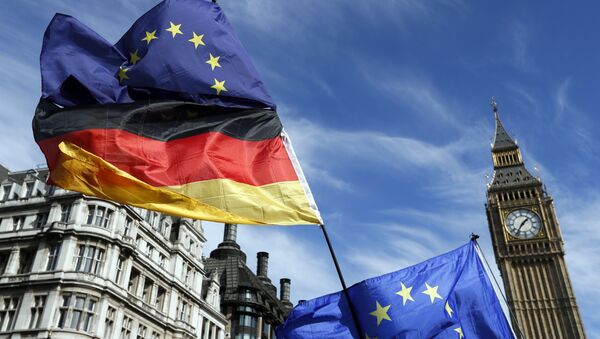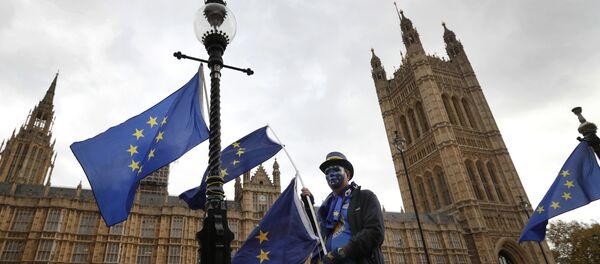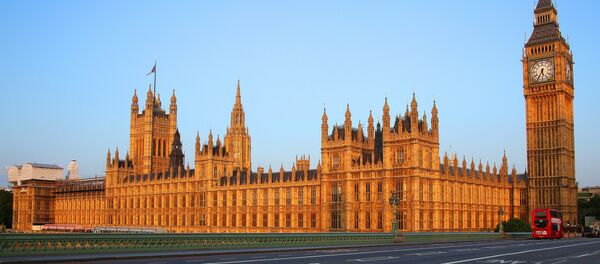Sputnik: What do you make of the latest opinion poll results?
Wellings: Polls are notoriously unreliable, particularly in recent years; they got it wrong about the EU referendum, they got it completely wrong about Trump in America and they got it completely wrong about the recent UK election, where most of the polls were predicting a big majority for Teresa May; but I think they tend to be commissioned by organizations that are against Brexit and this is part of undermining public confidence in the Brexit process. A lot of reluctant remainers who in their hearts wanted to vote to get out of the EU were actually convinced by this scaremongering campaign called
Sputnik: But on the other hand, Prime Minister May has said there’s a good chance we’ll have a no deal scenario, so what does that mean?
Wellings: The negotiating team and the government will come under enormous amounts of pressure from big business, for example; they benefit quite a
READ MORE: Drifting Apart? Former UK Diplomat Warns of Cooler Post-Brexit London-Paris Ties
Sputnik: Do you think that the government will ever allow a second referendum?
Wellings: It’s possible at a later stage, but I don’t think it’s likely in the near future because I think it would potentially undermine their negotiating hand with the EU, it could provide incentives to the EU to offer quite a bad deal or to manipulate the outcome somehow in order to encourage a remain vote in the second referendum or encourage some kind of political crisis in the UK, so I don’t think it’s likely now. If circumstances change, if there’s some kind of massive swing in public opinion then there could be one I suppose. If you got 48 percent roughly supporting remain and then there will be some pro leave people who think a second referendum would be a good idea in order to put the issue to bed and stop all this consisting complaining.
READ MORE: Corbynistas Tighten Their Grip on UK Labour Party
Sputnik: So do you think there would actually be a different result then in 2016 if a second referendum were held?
Wellings: Seeing that there’s no great change in the economic situation, obviously you will get recessions from time to time, but as long as there’s no change in the economic situation, I think it will be the same result, because, as I said, there were a lot of reluctant remainers who were scared into voting remain by the “Project fear” campaign, all these scary stories about the economic collapse and the fact that it hasn’t happened as the politicians claimed means they will no longer trust this sort of scaremongering in the future, and it would be the same result. And also, I think there is an element in the EU who would like to see UK go as well, that means they will have fewer barriers to their closer Union and creating an EU super state, so you might find some reluctance from their part for a second referendum.
Sputnik: A very interesting thing that was reported was that Norway had warned Brussels allegedly that if they gave in to the UK’s demands for a special trade deal, that could cause Oslo to terminate their own agreement with the block; do you think there’s any truth in that? Will that have any effect on the Brexit negotiations?
Sputnik: How do you see the Brexit process going forward or what would be the biggest stumbling blocks ahead and what will it end with?
Wellings: I think that there are difficulties over financial services, given that the UK is a major exporter of financial services and the City of London is a major global financial center which makes it absolutely crucial to the UK economy and the reason why that’s generally not well caveat in other trade deals, having said that, even if there were a short-term hit, if the UK were able to deregulate, then of course the City would compete much better with some of these new financial centers in emerging markets, the likes of Dubai, Hong Kong and Shanghai, so I don’t think it would be the end of the world, but obviously Teresa May would be under immense pressure from some of these big banks and financial firms to get a deal on financial services, which in turn could lead to some unfortunate concessions in some of the other parts of the economy in terms of still adhering to EU regulation.
The views and opinions expressed in this article are solely those of the author and do not necessarily reflect those of Sputnik.






